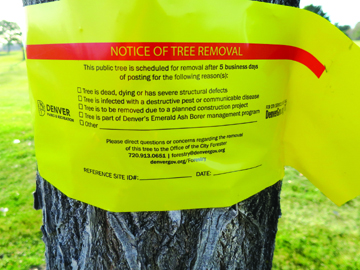
by Mark Smiley | Dec 17, 2017 | Main Articles
‘Train To The Plane’ Terrorizes Neighborhoods
by Mark Smiley

Hellish Nightmare: The A-Line Train To The Plane was to be RTD’s crowning achievement. Instead, it has become the A-Train from Hell for many citizens.
The A-Line train to Denver International Airport (DIA) was supposed to be an exemplary and shining light for RTD’s Light Rail System. However, Front Range citizens were sold a bill of goods in the 2004 election when they approved a tax increase. Voters envisioned a state-of-the-art rapid transit train going from Union Station to DIA. RTD even gave it its highest moniker, The A-Train. But for many citizens of Denver and surrounding communities, it has become the A-Train from Hell.
It has been causing injuries, driving residents from their homes with its loud horns, and has suffered innumerable malfunctions, causing major delays and having passengers miss flights on a regular basis. In fact, the train was struck by lightning twice in 2017 (May and June). The June, 2017 lightning strike forced 81 passengers to be evacuated and walk along a 50-foot-high bridge after a nearly two-hour delay. The entire 23-mile stretch of the A-Line was shut down for close to six hours. Many potential passengers that were relying on this mode of transportation had to find alternative options to the airport.
The reason RTD chose commuter rail over light rail is the ability to run longer stretches of track with fewer stations, travel at speeds up to 80 mph, and have the capacity to transport more passengers. But, the entire system has been a headache for everyone involved since it was launched.
The original plan called for quiet zones but because of countless problems with the crossing technology and switching and signaling, the Federal Railroad Administration (FRA) forced RTD to deploy human beings at each crossing known as the “flag men.” They are stationed at each of the 11 crossings along the A-Line to monitor each train that goes by and ensure automobiles and pedestrians do not cross the track.
RTD pays each flag man $13 per hour and by the time it is all said and done, the total cost of having them at these intersections may come close to $12 million. The flag men are necessary 24 hours per day because of timing glitches on the grade crossings. Part of the timing issue is that the gates are lowered earlier than needed and stay down up to 20 seconds longer than is federally mandated.
The aforementioned quiet zones allow trains to forgo sounding their horns at crossings as long as certain safety measures such as flashers, sturdier railroad gates, upgraded railroad circuitry and raised medians are in place to protect motorists. Up to this

Déjà vu: Many remember the computerized baggage-handling system at DIA and how it was a disaster causing mass chaos and massive delayed luggage retrieval.
point, the FRA has determined that the crossings do not meet these standards. Therefore, the horns must be blown. And, since it started, residents in neighborhoods, such as Park Hill, Clayton and Stapleton, have heard the horns blow almost 340,000 times.
“The Elyria-Swansea and Globeville neighborhoods of Denver have been treated like garbage for generations,” said former Denver City Councilman Ed Thomas. “They have been treated this way for two reasons. Elected officials believe that people that live in those neighborhoods do not matter and they themselves do not live there so they don’t have to live with their decisions.”
This issue has plagued the train since its inception in April 2016. Notwithstanding the fact, that after one year of these glitches which continue to cause delays and scheduling snafus, RTD claims they had solved the problem. Federal regulators signed off on and were satisfied that the timing issues were fixed, bu

Guest Complaints: Guests of the DoubleTree Hotel, which is situated one block from the train tracks, have complained of the loud horns that blare all evening. The hotel offers sound machines, ear plugs, and box fans to help drown out the deafening noise.
t the Colorado Public Utilities Commission did not agree and denied RTD’s certification the same week back in September 2017.
A hearing on this matter is set for March but might be heard as early as February 15, 2018, if there is no objection from the Union Pacific and BNSF railroads. The Colorado Public Utilities Commission administrative law judge Robert Garvey will hear the case and decide whether the gate crossings are operational and safe. If he rules in favor, the flag men can be removed.
These scheduled hearings, and the fact that the A-Line train that has been blasting through neighborhoods for nearly two years, offer little comfort for residents of Park Hill and surrounding neighborhoods.
The sound of loud train horns bellow through otherwise sleepy neighborhoods. The RTD A-Line Train to Denver International Airport blasts through neighborhoods with horn sounds at a federally mandated 96 decibels. That is comparable to a motorcycle revving up a few feet away. The reason for these horns is due to technological glitches that have tainted the “train to the plane.”
Trains cross these intersections nearly 5,000 times per month and blare the horns four times for a total of 20 seconds each time. The deafening horn has neighbors up in arms. “I can’t believe how loud those trains are and I live seven blocks away,” said Julie Buckner. “There is no break from the noise. It’s constant.” Buckner lives seven blocks away but some homes are just 1-1/2 blocks from the crossings.
The DoubleTree Hotel on the north side of Smith Road on Quebec Street is located just one block from the train tracks and guests of the hotel are surprised when they check in and are offered noise machines, ear plugs, and box fans. “I will never stay at this hotel again,” said Joan Kelleher from Flint, Michigan. “The sound of the train echoed through my room all night long. What is the deal?”
Under the Train Horn Rule (49 CFR Part 222), locomotive engineers must begin to sound train horns at least 15 seconds, and no more than 20 seconds, in advance of all public grade crossings. The maximum volume level for the train horn is 110 decibels which is a new requirement.
RTD has the horns sounds close to the maximum allowed decibels and according to a letter sent to The Denver Post, residents can hear it as far as the Montclair neighborhood which is 25 blocks away at 12th Avenue and Elizabeth Street.
Some residents of Denver are having déjà vu as they remember the baggage claim issues at DIA. The computerized baggage-handling system was an unmitigated disaster whi

System Failure: RTD operates the 23-mile stretch of the A-Line train from Union Station to Denver International Airport. Many have been affected by the technological glitches that have plagued this system for nearly two years.
ch caused mass chaos. It was plagued by serious mechanical and software problems that has a ripple effect even today.
When the trains in between concourses broke down the day before Thanksgiving in 2017, people wondered if everything DIA is associated with turns sour. If the bad luck continues, RTD’s A-Line Train To The Plane will be next in a long line of failures associated with the airport.

by Mark Smiley | Dec 17, 2017 | Main Articles
by Glen Richardson

Open Season: Paul Rosenthal, a Democrat for House District 9, is faced with sexual harassment claims. Some are saying not all accusations necessarily have merit and that it is open season on some high profile people.
The sexual harassment claims that are sweeping the country have also hit the Colorado legislature with claims made against four different legislators including Paul Rosenthal, a Democrat representing House District 9, which includes Glendale and parts of the Cherry Creek Valley.
Rosenthal who is openly gay initially was accused by Thomas Cavaness, a political organizer for Jared Polis, of inappropriately touching him at a political campaign event some time before he was first elected to the legislature in 2012. The Denver Post came to his defense in a lead editorial asserting that they did not believe “anything in Cavaness’ report precludes Rosenthal from remaining in office. The Post noted that the alleged incident occurred before Rosenthal was elected for the first time in November 2012 and questioned what jurisdiction the Speaker’s Office would have in the first place.
The Denver newspaper noted that the two men had exchanged friendly Facebook messages around the time of the campaign event and that Cavaness couldn’t recall when exactly the harassment occurred.
The publicity of the Cavaness claim caused a second complaint to be filed with Speaker of the House Crisanta Duran, reported first by Fox 31 Denver News. The man is identified only as “Dan” and asserts he was the roommate of Rosenthal back in 2007 and 2008 when he said Rosenthal made “several inappropriate comments” and that he had appeared unannounced while he was sleeping. He said he wrote the complaint to Duran, stating that he could no longer “remain quiet.”
The second complaint was generally greeted with disbelief and derision. Rosenthal’s attorney Harvey Steinberg remarked, “The only thing more ludicrous than this complaint is that FOX 31 would report it.”
Then on November 17, 2017, it was reported in The Denver Post that sometime earlier Heather O’Donnell, an attorney and former legislative policy aide, complained to her boss, Rep. Tracy Kraft-Tharp, that Rosenthal repeatedly attempted to get her to set up a meeting with her brother saying he found him “attractive” and he could help him professionally.
She declared his actions to be “predatory.” Kraft-Tharp in turn reported it to Duran but O’Donnell declined to file a formal complaint. The Speaker’s Office provided Rosenthal with materials concerning workplace and sexual harassment policies.
Anecdotally, the complaints do not appear to be gaining much traction in the 9th District. Sally Perone indicated, “Rosenthal tried to be introduced to somebody’s brother and said something inappropriate to his roommate a decade ago. Is there any human interchange that is not sexual harassment these days? Perhaps politicians deserve it, but this is really open season on them.”
A local shop owner on Colorado Boulevard who did not wish to be identified stated, “It is the season of the witch. The press giving such exaggerated coverage to claims such as those against Rosenthal do a real disservice to the people who have suffered real sexual assault and harassment. The real claims now get lost among all the clutter. It is a real shame.”
Rosenthal who will be up for re-election in 2018 for his final term has always received above 60% in his prior election efforts for the District seat.

by Mark Smiley | Oct 23, 2017 | Main Articles
by Ruthy Wexler
Late in August 2017 a Denver school burst onto the national stage when videos of an East High cheerleader crying in pain from “forced splits” went viral. Media anchors across the country expressed shock and assured viewers that Denver Public Schools (DPS) Superintendent Tom Boasberg had fired the coach. Following an investigation, Boasberg removed two longtime staff from the school and said East could “now move forward.” But the Chronicle discovered that DPS had stepped over the real story in its rush to craft one more to its liking — and throw blame as far away as pos sible.
sible.
By the time Denver’s DA announced on October 14, 2017, that there was no basis to press criminal charges, three lives had been irrevocably upended.
How It Started
The videos that upset the world were taken in the first week of cheer camp, June 4-8. Ally Wakefield, the girl in the most-viewed video, showed it to her mother, who complained to East’s Athletic Director Lisa Porter.
On June 16, 2017, Porter met with the Wakefields, along with Principal Andy Mendelsberg, newly-hired Cheer Coach Ozell Williams and Vice Principal Terita Berry, a former Broncos cheerleader, who explained that the forced stretches were not uncommon in competitive sports, but she did not condone them.
Mendelsberg then instructed Williams to discontinue the forced splits. Williams agreed.
After school resumed in August, Porter invited all cheer parents to an August 24, 2017 meeting, where she, Mendelsberg and Berry would hear each parent’s c oncerns “so we can all work together to support the East Cheer Team.”
oncerns “so we can all work together to support the East Cheer Team.”
But that meeting never took place because on August 22, someone sent the videos to Channel 9 News.
Escalation
“What gets me is that Channel 9 didn’t do any investigative reporting,” said a longtime East teacher. “Once they showed it, everything changed.”
On August 23, 2017, Channel 9 aired the video; immediately, Denver Police opened a criminal investigation and Boasberg placed five DPS staff, including Mendelsberg and Porter, on administrative leave.
On August 25, 2017, Boasberg terminated Ozell Williams and shared that DPS would hire an “outside law firm to conduct an independent investigation.”
On September 22, 2017, Boasberg announced that Andy Mendelsberg would retire and Lisa Porter had resigned. The just-submitted report, said Boasberg, showed the two “did not take the necessary steps to ensure that the physical and emotional health and safety of students on the cheer team was fully protected.”
We Could Have Explained!
“We all knew Andy had followed proper procedure,” said Paul Prendergast, one of many parents upset at Mendelsberg’s departure.
Mendelsberg told those who contacted him, he “could not talk.”
“It was all hush-hush, don’t ask questions,” said a longtime East teacher. “Then it’s, ‘Oh, we have a new principal, isn’t this wonderful.’”
At a September 25, 2017, East Parent Meeting, Boasberg introduced John Youngquist, a former East principal who would return to that position. Boasberg told the hushed crowd that “due to the ongoing criminal investigation” he could not answer questions.
“I need to tell you, this was one of the most painful situations I’ve faced as superintendent … Lisa and Andy are colleagues and friends. But the Independent Report laid out in painful detail how our students’ safety was not properly cared for.”
A month prior, at a meeting with Boasberg, one student asked him, “Did you ever try to talk to any of us cheerleaders?”
“No.”
“Why not?”
“Because I have two daughters and the video upset me,” said Boasberg.
“That got me so angry,” the cheerleader later recalled. “Because we could have explained so easily.”
Story Behind Videos
Cheer mom Darcelle Carter says, “If I wasn’t a sport person, I might sit on my couch, see that video and say ‘Oh how awful!’ But I know better. If someone took a video of my basketball coach in high school m aking us do 30 suicides and all of us sweating and pleading … “
aking us do 30 suicides and all of us sweating and pleading … “
“Coaches push athletes,” said Nikki Higgs. “Cheerleading is now a very competitive sport. Not pom-poms and dress up. A majority of us parents loved how Coach Williams pushed our girls to excel.”
“Before the cheer camp, we’d gone to clinics and watched Ozell work with the girls,” said parent Ernest Higgs. “That’s where he demonstrated the stretch. No secret! We watched our daughter do the stretch. It hurt. But we understood, it was a coach pushing an athlete.”
Not Forced
“At camp, Coach O explained why the stretch helped, how it worked, that it might hurt,” said Aaliyah Ali.
“Coach went around and asked each girl if she wanted to do it,” said Shailee Morse. “It was voluntary. Not forced like the news said. Ally said she wanted to do it. The first time, she’s like, ‘I’m not comfortable.’ Ozell stopped. Then she wanted to do it again. They had a conversation. ‘If you do it, you gotta commit to being down for the full 30 seconds. Otherwise it won’t do you good.’ Ally said okay.”
“We all knew it would hurt,” said Nyla Higgs. “Coach said, whatever helps get us through, we should do, like cry, curse, whatever. Ally could stop at any time! But because of what she said before, we believed her crying was her way of getting through it. She never told us different.
“Afterwards, Coach went around and asked if anyone felt forced or bad about the stretch. No one did. Then we took a lunch break and danced the whole time, Ally too. That whole next week, we danced, went to Elitches, ran around.”
Lawsuits
“When it all came down, we were blindsided,” said cheer mom Annie Morse.
At least five sources attest they saw a post by Ally Wakefield on Facebook to the effect of: Watch how DPS will pay for my college tuition.
On CNN, Kristen Wakefield said, “[In that video] People are attacking my little girl and no one stopped them.”
“That’s for a lawsuit,” said one parent. “Attack? Don’t make me laugh.”
“Look at the video,” said cheer parent Darcelle Carter. “Those girls are holding her up.”
“Believe me, if you’ve got a pulled hamstring,” said Morse, “you don’t go dancing around like she did.”
“We’re not blaming [Ally], she’s too young to understand the consequences,” said Nikki Higgs.
The Wakefields’ lawyer did not respond to requests for comments.
Not So Independent
DPS now refers all questions about the cheerleading incident and its aftermath to the official Report of Investigation Concerning Matters Involving the Denver East High School 2017/ 2018 Cheer Team, posted helpfully online.
But many aspects of this supposedly definitive report are troubling.
Instead of the promised “outside” law firm, DPS hired Davis Graham & Stubbs (Davis Graham), which the District has been paying $100,000 per year, with Deputy Counsel Michael Hickman the main contact in real estate transactions. DPS General Counsel Jerome Deherrera was an attorney at Davis Graham.
“The blatant conflict of interest is appalling,” said a Denver attorney.
One East parent read the whole 30 pages, “… only because I thought, soon I’ll see the part that made them let Andy go. Nothing! I’m a professional and I tell you, this report did not make sense.”
“What disturbs us,” said Ernest Higgs, “is that we shared our thoughts in good faith with the investigators. But in the report, they mention the T-shirts we wore but left out our full comments. That’s not a real investigation.”
Three Lives
Being principal of East was Andy Mendelsberg’s dream job.
Now, at 49, he’s cut adrift from the work and kids he loved.
While on leave, Mendelsberg wrote a four-page letter to DPS, laying out in earnest detail how he’d done his job correctly. He’d followed procedure by speaking (on June 16, for 13 minutes) with the school’s Human Resources Officer Saundra Stanfield. He contacted DPS’s legal department on June 18, had a 19-minute conversation about the videos with Michael Hickman, who did not ask for the videos or mention abuse. When Mendelsberg expressed concern that the videos might go viral, Hickman replied, “I think the process outlined after that meeting will ameliorate the situation.”
In the official Davis Graham report, Hickman says he asked for the videos and Mendelsberg refused.
Interviewed on October 16, an emotional Mendelsberg stated, “That is simply a lie.”
Mendelsberg, at least, is getting “continued payment” — DPS refuses to call it a settlement — from the District.
Lisa Porter, about whom colleagues say, “This school was her life,” got nothing.
Ozell Williams’ reputation is smashed.
Before he came to East, Williams was known in the tumbling world as “an incredibly caring, talented coach,” says former student Hannah Shelput. “Everybody knows he is not that person depicted in the press.”
Over a dozen parents came forward to say how positively Williams’ coaching affected their children. “Ozell overcame obstacles. He gets very excited about others overcoming obstacles,” said Shalondra Haggerty.
Mariah Cladis, assistant coach at East, said, “I just wish people knew about the numerous meetings Ozell and I had. He got so excited about making the girls laugh or thinking how to steer them toward college.
“Maybe a little too ambitious for them sometimes, but oh, he would never hurt them. That’s not what was going on.”
Since DPS fired Williams, his business Mile High Tumblers has suffered. He’s had trouble finding work. Even reporting the ‘no basis for criminal charges’ story, media outlets continued to describe Williams as “the coach that physically forced girls into splits.”
“It’s like Ozell was just … a forgotten person,” said Carey. “How can you do that, leave someone behind in the dust?”
And For What?
To address this crisis, DPS hired the PR firm Ground Floor Media, Flynn Investigations, Davis Graham attorneys charging between $385 -$485 per hour for many hours of interviews; and made a substantial financial arrangement with Mendelsberg.
All the above is paid for with taxpayer money.
And for what?
“Why would DPS want to get rid of a principal who made East better and better until it was the most requested high school?” said parent Megan Ackley. “It doesn’t make sense.”
A source close to DPS said it does make sense. “Boasberg has been upset with East’s ever-increasing importance, how it keeps getting bigger. He wants to cut it back. And at such a visible high school, Boasberg prefers to have someone he can manage.”
From all accounts, Mendelsberg was an outspoken individual who let his teachers teach.
Did Boasberg see the cheerleading incident as a way to get rid of Mendelsberg?
Why didn’t the whole thing stop when Williams agreed “no more forced splits?”
Why did DPS cave to a few families’ threats of lawsuit? Why didn’t they — as Nikki Higgs plaintively asks, “… let the cheerleaders — the real eyewitnesses! — tell what really happened?”
As long as the Board remains silent, and DPS continues to shroud its doings in secrecy, we won’t know the answers.

 Yelp, founded in 2004, is a multinational corporation based in San Francisco that develops, hosts and markets Yelp.com which publishes reviews about local businesses. This crowd sourced review website has an estimated value of over $2.3 billion. This giant company has tactics that some business owners in the Cherry Creek Valley find manipulative and overly aggressive. Their sales techniques and the way reviews are posted under individual businesses have been called into question.
Yelp, founded in 2004, is a multinational corporation based in San Francisco that develops, hosts and markets Yelp.com which publishes reviews about local businesses. This crowd sourced review website has an estimated value of over $2.3 billion. This giant company has tactics that some business owners in the Cherry Creek Valley find manipulative and overly aggressive. Their sales techniques and the way reviews are posted under individual businesses have been called into question. 






















